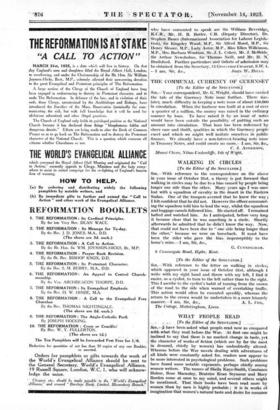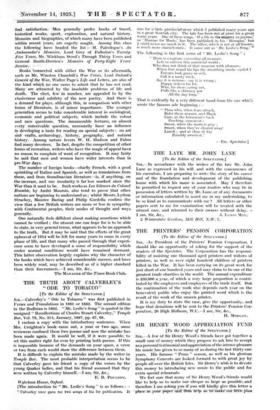• inclined to say that there is no marked change
in taste, yet -t,he character of works of . fiction (which are by far the most in demand, chiefly by women) . has undoubtedly altered. Whereas before the War novels dealing with adventures of all kinds were constantly asked for, readers now appear to be more interested in psychological problems. Such problems have found some notable exponents, perhaps chiefly among women writers. The names of Sheila Kaye-Smith, Constance Holme, Rose Macaulay, Beatrice Kean Seymour and Mary Borden come at once to my mind, and several others might be mentioned. That their books have been read more by women than by men is highly probable ; it is in works ot imagination that women's natural taste and desire for romance
find satisfaction. Men generally prefer books of travel, historical works, sport, exploration, and -natural - history. Memoirs and biographies, of which many have been published within recent years, are eagerly' sought. Among this class the following have headed the list :—M. Paleologue's An Ambassador's Memoirs, Lord Grey of Fallodon's Twenty- Five Years, Mr. Wickham Steed's Through Thirty Years and General, Smith-Dorrien's Memoirs of Forty-Eight Years'
Books /connected with either the War or its aftermath, such as Mr. Winston Churchill's War Crisis, Lord Oxford's Genesis of the War, Walter Page's Life and Letters, are also of the kind which, no one cares to admit that he has not read. Many are attracted by the insoluble problems of life and death. The elect, few in number, are appealed to by the elusiveness and subtlety of the new poetry. And there is a demand for plays, although this, in comparison with other forms Of literature, is of minor importance. The younger generation seems to take considerable interest in sociological, economic and political subjects, which include the Colour and raee questions. The innumerable lectures, on almost every conceivable question, necessarily have an influence in developing a taste for reading on special subjects : on art and crafts, archaeology, history, geography, and natural history. Among nature lovers W. H. Hudson and Fabre find many devotees. In fact, despite the competition of other forms of recreation, writers who have the magic of appeal have no reason to complain of want of recognition. It may fairly be said that men and women have wider interests than in pre-War days.
The number of foreign books—chiefly French, with a good sprinkling of Italian and Spanish, as well as translations from these, and from Scandinavian literature—is, if anything, on the increase, and our insularity is far less marked since the War than it used to be. Such works as Les Silences du Colonel Bramble, by Andra Maurois, also tend to prove that other nations are beginning to understand us;- whilst Messrs. Lytton Strachey, Maurice Baring and Philip Guedella confirm the view that a few British writers are more or less in sympathy with Continental peoples, their modes of thought and ways generally.
One naturally feels diffident about making assertions which cannot be verified;- the utmost one can hope for is to be able to state, in very general terms, what appears to be an approach to the truth. But it may be said that the effects of the great upheaval of 1914 will be felt for many years to come in every phase of life, and that many who passed through that experi- ence seem to have developed a sense of responsibility which under normal conditions would have remained dormant. This latter observation largely explains why the character of the books which have achieved considerable success, and have been widely read, may be described as of a higher standard than their forerunners.—! am, Sir, &c., The MANAGER of the Times Book Club.



























































 Previous page
Previous page